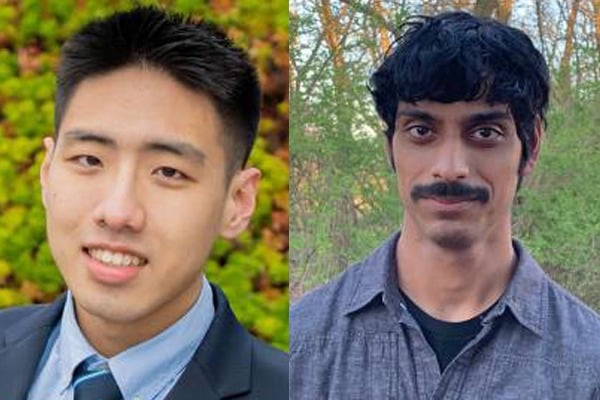Two juniors studying biomedical engineering at Johns Hopkins University have been awarded Goldwater Scholarships for their research and achievements in the fields of science, technology, engineering, and math. Min Jae Kim and Shiker Nair are among a cohort of 410 Goldwater Scholars selected for 2021–22 from an estimated pool of more than 5,000 applicants.
Established in 1986, the Goldwater Scholarship was one of the first significant national scholarships focusing on STEM fields. The program awards winners $7,500 for tuition, fees, books, and room and board. The national recognition has also been known to give students a competitive edge when pursuing graduate fellowships in their fields, as the Goldwater Scholarship website notes: “Goldwater Scholars have been awarded 94 Rhodes Scholarships, 150 Marshall Scholarships, 170 Churchill Scholarships, 109 Hertz Fellowships, and numerous other distinguished awards like the National Science Foundation Graduate Research Fellowships.”
Schools nominate up to four students from a pool of sophomores and juniors, selected for their research record and potential for leadership in STEM fields.
2021–22 Goldwater Scholars from Johns Hopkins BME:
Min Jae Kim, a junior biomedical engineering and neuroscience major, is driven to improve clinical tools for monitoring and treating Parkinson’s disease and other neurodegenerative diseases. His most recent work, with Kelly Mills in the Department of Neurology at the School of Medicine, is focused on developing predictive models for deep brain stimulation, to help clinicians achieve greater accuracy in setting stimulation parameters. He has also worked with William S. Anderson in the JH Functional Neurosurgery Lab to develop more accurate tools for measuring motor symptoms in Parkinson’s disease patients. Kim contributed to the scientific response to the pandemic by leading a team of engineering students seeking to minimize the leak of viral COVID-19 particles from CPAP masks, expanding safe access to noninvasive ventilator support, under the guidance of Noah Lechtzin in the School of Medicine’s Department of Pulmonary Medicine. Kim devotes his spare time to educating the public about clinical research on movement disorders and, on campus, leading the Johns Hopkins Monarch Initiative.
Shiker Nair, a junior biomedical engineering major, strives to design computational tools to aid early diagnosis and personalized treatment of debilitating heart and lung diseases. As part of the CIRCUIT program at the Applied Physics Laboratory, he helped develop a computational pipeline for diagnosing and subtyping patients with chronic obstructive pulmonary disease solely from computed tomography scans. His team has recently filed a patent application for this computational tool. This past summer, Nair was employed by Merck Pharmaceuticals to develop an open-source algorithm for analyzing how cardiomyocyte stem cells respond to specific drugs. After 12 weeks, his new algorithm outperformed the $100,000 commercial system the company had evaluated for this same drug development task. When not in the lab or working with his BME design team, Nair stays busy volunteering with Thread and APL’s SAT coaching program, and helping to run a youth mentoring program he co-founded in his hometown of King of Prussia, Pennsylvania. For fun, he makes his own rap music and beats to share with his SoundCloud community.

